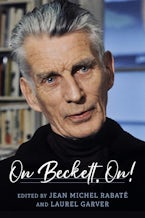Introduction, by Jean-Michel Rabaté
Nothing is Impossible: Bergson, Beckett, and the Pursuit of the Naught, by Jeremy Colangelo
Beckettian Habit and Deictic Exhaustion, by Shuta Kiba
Glitches in Logic in Beckett's Watt: Toward a Sensory Poetics, by Amanda M. Dennis
Beckett's Vessels and the Animation of Containers, by Hunter Dukes
Blanchot in Infinite Conversation(s) with Beckett, by Arleen Ionescu
Beckett, Painting and the Question of "the human", by Kevin Brazil
Art of Impoverishment: Beckett and arte povera, by Erika Mihálycsa
Beckett, War Memory, and the State of Exception, by Emilie Morin
Putting the Impossible to Work: Beckettian Afterlife and the Posthuman Future of Humanity, by Ruben Borg
Dogging the Subject: Samuel Beckett, Emmanuel Levinas, and Posthumanistic Ethics, by Karalyn Kendall-Morwick
A Defense of Wretchedness: Molloy and Humiliation, by Rick De Villiers
Who Hobbles after the Subject: Parables of Writing in The Third Policeman and Molloy, by Yael Levin
" 'Tis my muse will have it so": Four Dimensions of Scatology in Molloy, by Andrew G. Christensen
"Strange laughter": Post-Gothic Questions of Laughter and the Human in Samuel Beckett's Work, by Hannah Simpson
The Illusionless: Adorno and the Afterlife of Laughter in How It Is, by Michelle Rada

